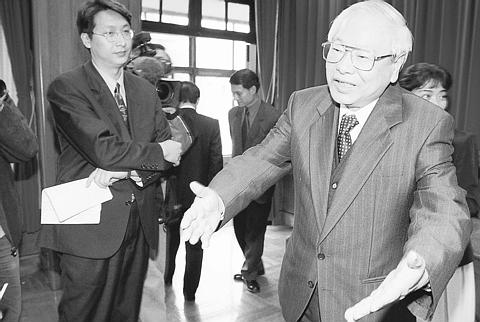Judicial Yuan officials yesterday dismissed accusations made by National Assembly deputies that the grand justices made "self-serving" interpretations of the Constitution.
They also expressed concern about the Assembly's proposal to abolish the Council of Grand Justices, warning that the passage of such an amendment would harm Taiwan's constitutional system.
The same Assembly deputies, whose proposal to abolish the Council passed committee review on Sunday, yesterday introduced another proposed amendment stating that the Council should remain in place, but that their life-long stipend guarantees should be cancelled.

PHOTO: CHEN CHENG-CHANG, TAIPEI TIMES
Speaking at a news conference yesterday, Judicial Yuan president Weng Yueh-sheng (
A group of Assembly deputies, including the party whips of the KMT and DPP, charged the Council of Grand Justices of "self-fattening" by making legal interpretations that entitled themselves to salaries for life, despite a system of limited terms for grand justices.
Such stipend privileges for grand justices were added into the organizational rules of the Judicial Yuan in 1992. The grand justices' stipend privileges were therefore passed by the legislature, not the Council itself, Weng said.
"No single one out of over 500 interpretations issued by the Council has ever interpreted the privileges or security of the grand justices. As for Interpretation No.396, cited by the Assembly deputies ? it has nothing to do with self-fattening," Weng said.
"[Grand justices' privileges] are a matter of governmental policy, not the intentions of the Council," Weng said. "In developed countries, the only fears over judicial officials' security is whether it is sufficient. The better the security, the more officials can perform their duties without misgivings or interference."
He also denied that the Council had pressured the legislature into making the law.
"It's impossible. How could the Council possibly have had the power to impose pressure on the legislature?" Weng said.
However, Weng's words were weighed against speculation by some that the Judicial Yuan was fighting back against the National Assembly.
"We are not criticizing [the Assembly deputies], only considering that such Constitutional amendments need to be clarified," he said.
Weng stressed that the current legal system was revisable, but that any reform requires a comprehensive plan. The current judicial system is not able to undertake the task of interpreting the Constitution, he said, and therefore the abolishment of the Council of Grand Justices would bring about a legal crisis and harm the public interest.
Grand Justice Chen Chi-nan (
"Should we accept such personal attacks?"Chen said.
On Sunday, Assembly deputies from the KMT and DPP reached a consensus to remove the life stipend guarantees of the grand justices, rather than to abolish the Council altogether as they had originally planned. In fact, the passage of the amendment to abolish the Council during Sunday's committee review session was only been meant to express deputies' discontent with the grand justices and is unlikely to pass second and third readings.
Many deputies were furious after the Council ruled in March that a set of amendments passed last year -- including one that extended the current Assembly's term by two years -- was invalid because it broke procedural rules.
Alex Tsai (

CHAOS: Iranians took to the streets playing celebratory music after reports of Khamenei’s death on Saturday, while mourners also gathered in Tehran yesterday Iranian Supreme Leader Ayatollah Ali Khamenei was killed in a major attack on Iran launched by Israel and the US, throwing the future of the Islamic republic into doubt and raising the risk of regional instability. Iranian state television and the state-run IRNA news agency announced the 86-year-old’s death early yesterday. US President Donald Trump said it gave Iranians their “greatest chance” to “take back” their country. The announcements came after a joint US and Israeli aerial bombardment that targeted Iranian military and governmental sites. Trump said the “heavy and pinpoint bombing” would continue through the week or as long

TRUST: The KMT said it respected the US’ timing and considerations, and hoped it would continue to honor its commitments to helping Taiwan bolster its defenses and deterrence US President Donald Trump is delaying a multibillion-dollar arms sale to Taiwan to ensure his visit to Beijing is successful, a New York Times report said. The weapons sales package has stalled in the US Department of State, the report said, citing US officials it did not identify. The White House has told agencies not to push forward ahead of Trump’s meeting with Chinese President Xi Jinping (習近平), it said. The two last month held a phone call to discuss trade and geopolitical flashpoints ahead of the summit. Xi raised the Taiwan issue and urged the US to handle arms sales to

State-run CPC Corp, Taiwan (CPC, 台灣中油) yesterday said that it had confirmed on Saturday night with its liquefied natural gas (LNG) and crude oil suppliers that shipments are proceeding as scheduled and that domestic supplies remain unaffected. The CPC yesterday announced the gasoline and diesel prices will rise by NT$0.2 and NT$0.4 per liter, respectively, starting Monday, citing Middle East tensions and blizzards in the eastern United States. CPC also iterated it has been reducing the proportion of crude oil imports from the Middle East and diversifying its supply sources in the past few years in response to geopolitical risks, expanding

Pro-democracy media tycoon Jimmy Lai’s (黎智英) fraud conviction and prison sentence were yesterday overturned by a Hong Kong court, in a surprise legal decision that comes soon after Lai was jailed for 20 years on a separate national security charge. Judges Jeremy Poon (潘兆初), Anthea Pang (彭寶琴) and Derek Pang (彭偉昌) said in the judgement that they allowed the appeal from Lai, and another defendant in the case, to proceed, as a lower court judge had “erred.” “The Court of Appeal gave them leave to appeal against their conviction, allowed their appeals, quashed the convictions and set aside the sentences,” the judges